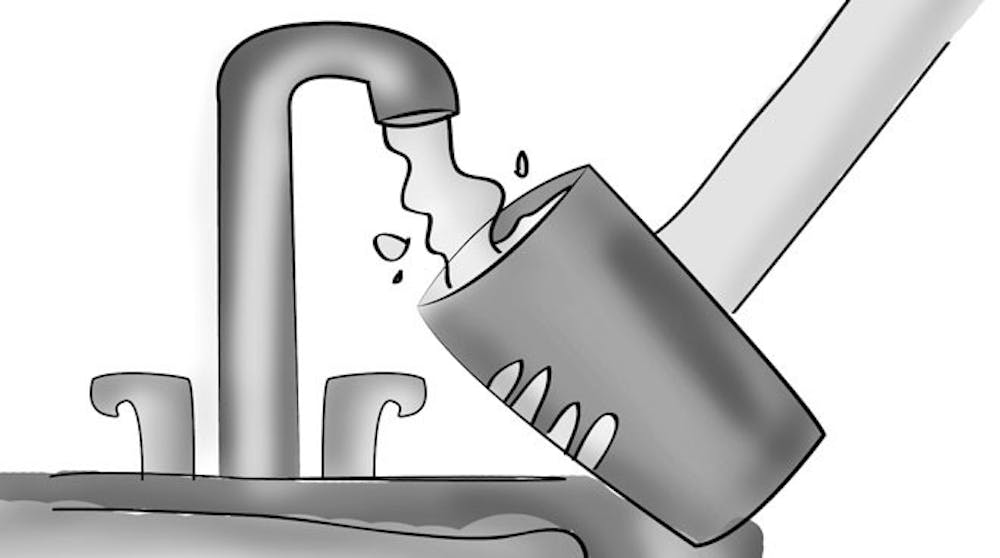I have never understood the addiction that some people seem to have to bottled water, let alone water itself. I hardly drink anything that lacks the fizz of carbonation, the lemon tang of Crystal Light or the bitter bite of coffee.
But from the U.S. to Canada, the administrations of 14 colleges, such as Saint Benedict and Macalester College in Minnesota, have taken note of the addiction and have acted against it.
The two universities have banned the sale of bottled water on campus during the past year for the sake of sustainability, according to a USA Today article.
The higher powers of Macalester College have tried to ease students into the transition, planting 31 "hydration stations" - water fountains with an additional spigot for refilling bottles - around campus, according to the article.
My reaction? I think buying water when it flows cleanly from taps is a strange and unnecessary luxury.
I also think it's ridiculous to attach more spigots to water fountains; one should do just fine, even if you have to juggle your reusable bottle a bit to catch the semi-awkward arch of water.
Others' reactions? The Minnesota College Republicans staged a protest against Saint Benedict's ban, and distributed plastic water bottles in a quiet battle for students' free choice, according to the article.
On the same campus, about 1,000 student petitioners slapped their seal of approval onto the ban with their signatures.
Predictably, bottled water companies are not tossing confetti with their party hats on. A spokesman for the International Bottled Water Association said the bans were generating false information related to bottled water consumption, and that the companies were pro-convenience rather than anti-tap water, according to the article.
Jerry Giordano, president of GreenUR, said he was very interested in spreading the phenomenon of banned bottled water sales to the University of Richmond, as long as a corresponding education program and increased access to tap water sources accompanied the change.
Safe drinking water streams out of sinks, but people are afraid to consume it because advertising has led them to believe that tap water is impure and bottled water is pure, Giordano said.
"The truth is that tap water, because it's public water, has to be tested many times every day," he said.
Enjoy what you're reading?
Signup for our newsletter
But because private companies are not held accountable by anyone, people are lucky if the company staff tests the water every week, he said.
Following the world's oil crisis, the water rights issue could be the next source of global conflict because of increasing populations and elevated water-stress issues, such as the shortage of clean water in India's Ganges River, Giordano said.
By purchasing bottled water, we are even doing damage domestically by heightening water stress issues' such as drought, and by expanding our carbon footprint and exposing our bodies to factory-related carcinogens, he said.
And for no good reason - a high percentage of bottled water is bottled in the same state that it's sold in, he said. "It's less safe than water that's in our own tap," he said.
It also drains our resources, as it takes 1.85 gallons of water to make the plastic for one bottle of water, according to the Treehugger Discovery Company.
Now that Environmental Awareness Week has evaporated into the past, organizations like GreenUR are working to figure out whether a campus ban on bottled water sales is possible, Giordano said.
The university is under a binding contract with Coca-Cola, and part of that deal is the university's obligation to sell whatever the company wants it to sell, including Dasani water, he said.
So our campus is caught in a legal bind with bottled beverage distributors. And we live in a business-centric world; advertising threads through medical practices, the food industry and politics alike.
As students, our young lives are spent preparing for the "real world," and we are taught to get there through employment.
But what kind of real world are we going to end up in? Can that world sustain the pollution and loss of natural resources that surge from our consumer habits?
I've never been a vocal tree-hugger, and I don't know what one campus community can do to noticeably reduce America's carbon footprint. But if we need to save the world we live in -- if not for our generation, then for others -- why not try?
Bottled water could be one of the simplest addictions to kick. Grab a glass, turn the tap on the sink and drink it in.
Support independent student media
You can make a tax-deductible donation by clicking the button below, which takes you to our secure PayPal account. The page is set up to receive contributions in whatever amount you designate. We look forward to using the money we raise to further our mission of providing honest and accurate information to students, faculty, staff, alumni and others in the general public.
Donate Now

